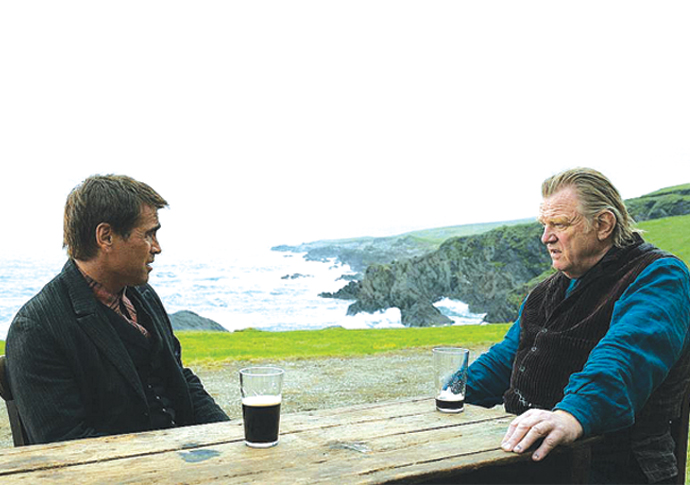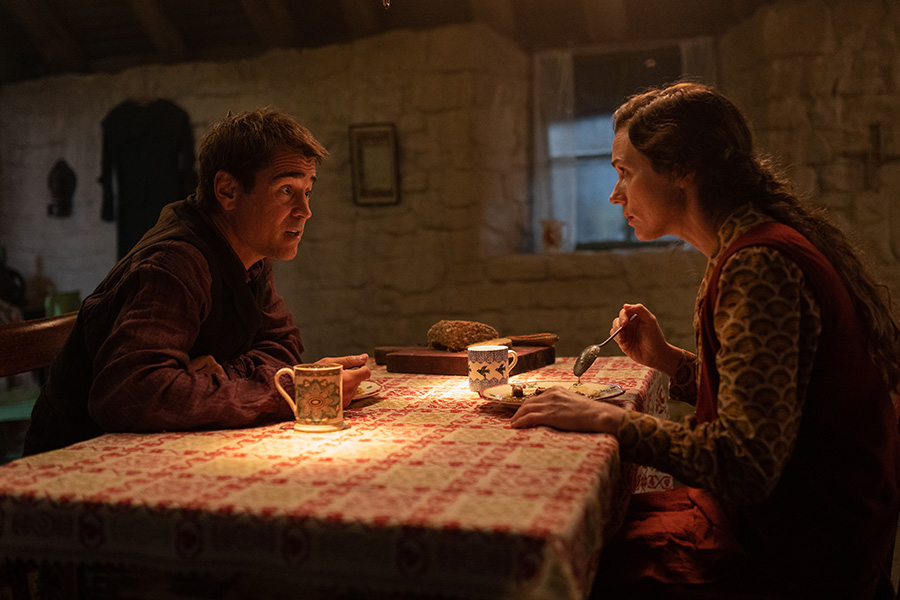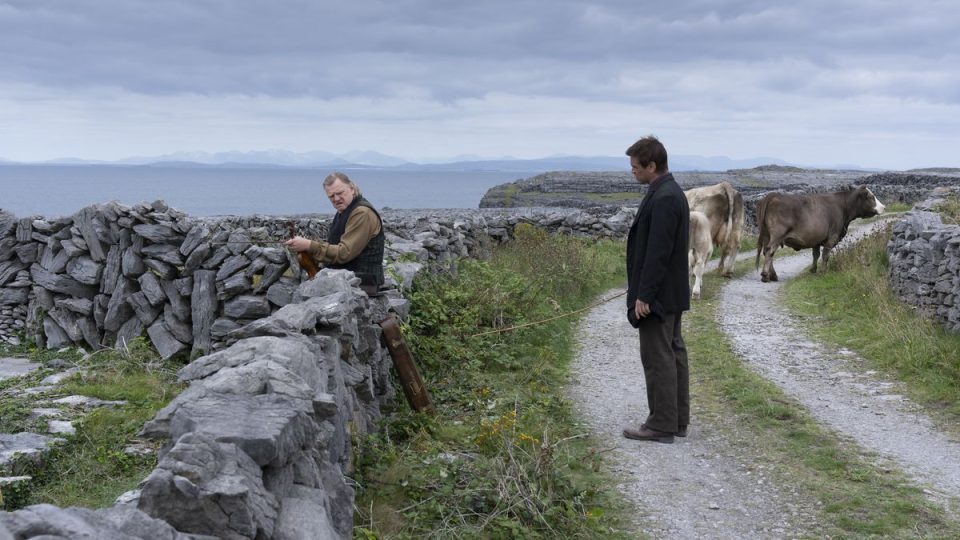
Why 'The Banshees of Inisherin' deserves to be the best film of the year

At its core, British director Martin McDonagh’s The Banshees of Inisherin, which is leading the Golden Globe Awards with eight nominations and tipped to win big at the 2023 Academy Awards, is a profoundly evocative tale of two former best friends — both of whom most of us ‘older folks’ will understand because we probably were one or the other at one stage in our well-experienced and ‘lived’ lives.
One…a simple cow farmer, Pádraic Súilleabháin (Colin Farrell), who lives on a small island, Inisherin, off the coast of Ireland, who is happy with the few bucks he makes and his many-years-long routine of going to the local pub at 2pm with his best friend, Colm Doherty (Brendan Gleeson).
And Colm, who looks across the water in 1923 Ireland, hears the sounds of gunfire and bombs as the Irish fight the Irish in a post-World War I universe and is intrigued by what lies on the other side. Colm, who dreams of being someone more than a village bumpkin that is epitomised by his friend, Pádraic, and lives in a house filled with collectibles and tchotchkes that signify a world that could be.
Most of us will understand them both, even if we identify only with Pádraic or with Colm. We’ll sense the deep hurt that Pádraic feels when his bestie decides to walk away from him on a whim. Or so it seems.
New journey of meaning and worthinessWe will understand Colm who literally wakes up one day and decides that he will make the remaining years of his life count because if your life hasn’t meant something, then what is it worth? Surely, we have all felt like that at some stage in our lives? Except, Colm begins this new journey of meaning and worthiness with a drastic step — by severing all relations with Pádraic because Pádraic is a dull, dim-witted man who has wasted enough of Colm’s life discussing the ingredients of his horse’s poop. Literally.
Also read: Elephant Whisperers: This documentary, up for Oscars, is a triumph of empathy
From that moment onwards the film is like a tennis match and you, literally, find yourself looking from one end of the screen to the other as these two former best friends slowly find themselves on the opposite side of the room. Or, in their case, the opposite ends of their local pub.

When Colm slams the tennis ball filled with his newfound sense of self towards Pádraic and makes the grand announcement that he ‘doesn’t like’ Pádraic anymore, you feel for Pádraic. You ache for him as he wonders — as did I — as to what is life after all if you cannot be a ‘nice’ human being?
But then you quickly get Colm who responds that ‘no one remembers nice.’ The world remembers and applauds and salutes something tangible. A melody or a tune that can transport people from the loneliness of their marriage, their boring 9-5 job, or in his case, the boringness of living on a small island of Ireland, Inisherin. A painting that can bring profoundly different meanings to different people. A poem that can transport you to a new world.
No Happy Endings, just like in real life
On the tiny island of Inisherin, Colm raises the stakes in the now not-so-friendly pub and throws down the veritable gauntlet of wanting to make his life count. And being friends with Pádraic will no longer cut it. We are as confused and as distraught as Pádraic who counters with — why does it have to be ‘either/or’? Why can’t it be ‘and’? Why can’t Colm create art and still be a friend?
As these two actors — GOATS (Greatest Of All Time), to me — slam their ball at one another, you find yourself rooting for them both. Colm believes there is no time to waste. Pádraic wonders what else in this world means more than good friends, good whisky, and a somewhat-happy life? Pádraic is so clueless that even after Colm takes the most drastic action to get his point across — he still doesn’t get it.
Even as you rejoice in Colm’s ability to write a song in a few days with his newfound musician friends only because he has all the time he formerly wasted with his dim-witted friend, a part of you also wonders, along with Pádraic, at the drastic choices that Colm makes to get his point across. You silent-yell at Colm for his cruelty. And then immediately find yourself nodding your head in agreement because he reminds you of yourself or someone you know — someone who is ambitious and yearns to discover a world beyond the small square piece of land they’ve lived their entire lives in.
But then you find yourself secretly and quietly ugly-crying when Pádraic flits around clueless like a bee searching for a flower to pollinate as to why Colm would treat him so poorly? We get it because at some point or another in our lives, we’ve all been sucker punched by those closest to us and drop-kicked us when we are already down and out.
You ache for Pádraic. You understand Colm. You keep your fingers crossed that Pádraic would have the balls to walk away from Colm and his increasing cruelty. You knock on wood and hope that while Colm would continue his path of self-discovery, he would still find his way back to Pádraic.
Also read: ‘Avatar: The Way of Water’: How James Cameron scales up the spectacle
These two men epitomise parts of ourselves. And that’s why we connect so much with their now opposite journeys.
As the two friends-turned-frenemies keep lobbying the tennis ball back and forth, so do we as the audience, privileged enough to be a fly on the wall amid the rich tapestry of the mundane and banality that one has embraced and the other rebels against.
Three-quarters into the film, you know as the audience that the denouement is just around the corner. You know that something profound is about to happen. And it does. And it does in a way that you don’t even remotely realize will happen. Or anticipate. At least I didn’t.
When both characters finally do what you yearned and prayed they would do — you realize that in this story, as with life, there are no happy endings the way we want them to be. But this is how it HAD to end. Because this is how life will end for most of us
Sleeper stunner of 2022
After putting up with one cruel lob after another, Pádraic eventually gathers his guts and finds glory. Over an incident that is at once simplistic as it is heartbreaking. And after meting out one unsympathetic lob after another when Colm finally ‘pays his dues’ and finds his ‘humanity’ — it’s all too little, too late. Again, that’s how it is in life, no?
Most times, if we are lucky enough to get justice or mete out our just deserts to someone who deserves it, the sense of relief and accomplishment often comes at a cost. Mostly, it comes with loss. And so it does to Pádraic and Colm.
As the audience, I rejoiced and felt gutted for both. As you sit back and watch The Banshees of Inisherin, you want to show Pádraic and Colm their own story back to them. But you know that they will never find what you need for them to find. Because life is not so simple.

This slow-burn of a film is the sleeper stunner of this year. And Colin Farrell and Brendan Gleeson aren’t actors ‘acting,’ they inhabit their parts. Stunningly enough, there is so much more to the story than the two protagonists or the two antagonists — depending on who you are in your life. The film has some of the best supporting cast you will find in 2022. Pádraic’s sister, Siobhan, played by the sublime Kerry Condon — a brilliant woman, probably the smartest on Inisherin, who had to sacrifice her smartness only because she was a woman in a man’s world. But who finally finds the courage to walk away from the safety of the island and the expectations that society has of a woman. It’s exactly 99 years today from when the story is set. And, circa almost the end of 2022, isn’t it shocking that I still identified with Siobhan’s experience? Because the world may have aged by a century, but so much of it still remains the same.
The human yearning for more
The young village simpleton, Barry Keoghan, abused by his policeman father but one who dreams of what could be and finds that it really couldn’t be and ends up exactly where we think he will. The friendly and confused bar mates at the pub who dn’t know which and whose side to take, the animals who mean more to the humans in the story than humans themselves, and the roles that the donkey and the dog play in the film’s final sequence and how it fundamentally changes the two men in the story.
And the stunning landscape that is Ireland. Inisherin is at once stunningly beautiful, but also poignant and lonely. Inisherin shows you how you can be lucky enough to be able to call one of the world’s most dazzling landscapes your home but also be profoundly unhappy living in it. It reiterates the most universal truth of them all: if you aren’t fulfilled on the inside, no amount of beauty on the outside can save you.
The beauty of the film is the simplistic audacity of The Banshees of Inisherin. If anyone wondered how/if Martin McDonagh can outdo himself after his last outing, Three Billboards Outside Ebbing, Missouri (2017), well, we have the answer.
I know I will watch this simple, but searingly beautiful film many, many, more times. It speaks to much of humanity’s yearning for always wanting more, more, and even more than what we have. But it also speaks to those who at least hope to be happy with who, what, and where they are and with what they have. But, most of all, it speaks to the majority of us who live somewhere in between.
Roopa Swaminathan writes essays, opinions, humor, and fictions. She had a monthly opinion column on Elephant Journal. Her books include Star Dust: Vignettes from the Fringes of the Film Industry (2005) and Bollywood Boom: India’s Rise as a Soft Power (2017). More about her here: www.themessyoptimist.com

